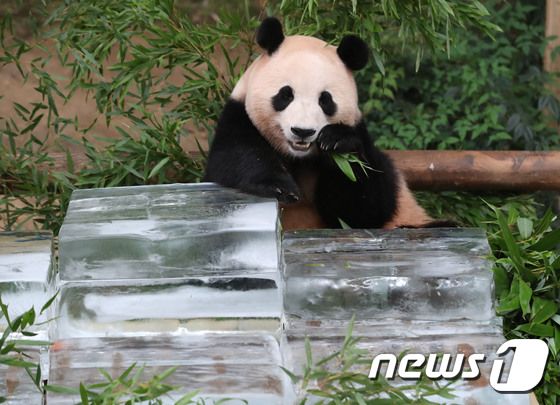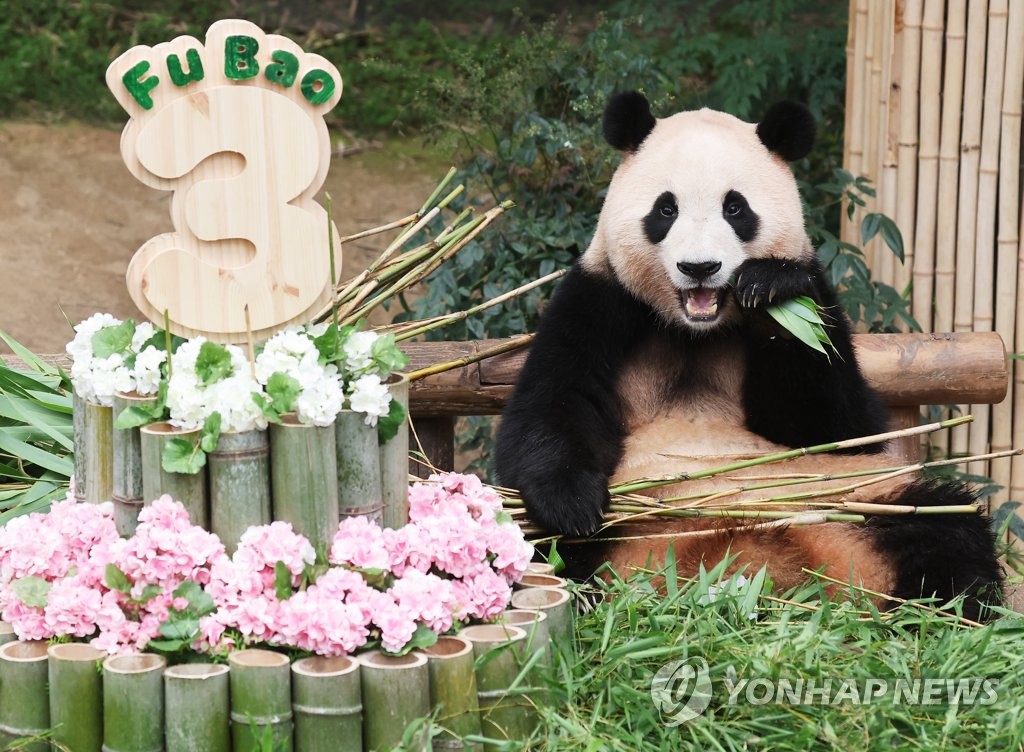 |
| ▲ Fubao (Photo from Yonhap News) |
Fubao, a baby panda born on July 20, 2020, to parents ‘Lebao’ and ‘Aibao’ that arrived in Korea from China in 2016 – has gained significant attention as the first giant panda to be born through natural reproduction in Korea. Although Fubao has become a star on social media with its adorable personality and appearance, Koreans were saddened to learn that the cub must return to China. Giant pandas are endangered animals and their movement is strictly regulated. They are not allowed to be traded but can loaned to other countries. The Korean government signed a memorandum of understanding with China when they brought in Lebao and Aibao. The agreement stipulates that any offspring born between the two pandas must be returned to China before reaching the age of four.
China is known for its unique diplomatic policy dubbed ‘Panda Diplomacy,’ which sees the nation rent out pandas to countries around the world. That it deems important for fostering diplomatic ties. Pandas, residing solely in China’s Sichuan region, are facing the threat of extinction, and hold a status akin to a national treasure. As a result, China’s loan of pandas to specific countries carries significance that goes beyond a mere temporary transaction. Panda diplomacy began in 1941 during the Sino-Japanese War with Chiang Kai-shek. The leader of the Chinese Nationalist Party presented a pair of pandas to the United States as a gesture of gratitude for its support. Then, in 1972, during President Richard Nixon's visit to China, Premier Zhou Enlai gifted another pair of pandas to the United States, which later gained notable prominence. However, in 1983, regulations prohibiting the sale or donation of rare animals to other countries came into effect, so panda diplomacy was modified from a gift of the treasured species to long-term rental for a fee. By leasing pandas to other countries, China receives an annual rental payment of one million dollars. This revenue is used to improve China's international image and fund environmental conservation initiatives. China has engaged in panda diplomacy with 18 countries, including South Korea, the United States, Russia, Japan, and Singapore, leasing out over 60 pandas. This strategy leverages the universally beloved and amicable image of pandas to foster a positive perception of China. In 2008, a panda named ‘Jing Jing’ was selected as the mascot for the Beijing Summer Olympics. Likewise, in 2022, a panda named ‘Bing Dwen Dwen’ was designated as the mascot for the Beijing Winter Olympics.
 |
| ▲ Fubao Celebrating her 3rd Birthday (Photo from Yonhap News) |
Recently, animal diplomacy has become a topic of controversy with the increasing fame of Fubao. There are two main concerns. Firstly, there is the problem of animal welfare. Exchanging live animals as diplomatic offerings raises ethical questions because the process of transportation can lead to extreme stress on the animals. In particular, pandas are vulnerable to anxiety when exposed to a new climate or environment because they live in specific natural habitats -China is the only suitable location for the giant panda in the world. In addition, separation from their friends and parents can also cause stress, as pandas form strong bonds with their companions. The second issue raised pertains to the effectiveness of animal diplomacy. For example, animals sent to maintain amicable international relations between countries can sometimes become a spark of conflict. If the animal is not appropriately managed, or if the relationship between countries gets worse, there are protests about returning that animal. If a country decides to return the animal due to management difficulties, it can lead to an awkward situation between the two countries. A poignant example lies in the tragic demise of ‘Le Le’, a male panda sent to the Memphis Zoo in the United States. His sudden death in 2003 ignited an emotional battle between both countries. Le Le’s sudden death, along with long-running accusations of mistreatment against the Memphis Zoo, caused an uproar in China. Eventually, Chinese experts visited the zoo and conducted an autopsy on Le Le to investigate the cause of death. At first, Le Le was part of China’s “panda diplomacy,” meant to serve as an envoy of friendship between China and the U.S. but after this dispute, Le Le became a symbol of mounting animosity and mutual distrust.
Opinions regarding the future of animal diplomacy are diverse and multifaceted. One side envisions favorable outcomes in the continued expansion of animal diplomacy. Notably, China has benefited greatly from panda diplomacy. Xing Haiming, Chinese Ambassador to South Korea, introduced panda diplomacy as a successful example of China's public diplomatic efforts. The program takes advantage of the fact that the animal has a gentle image. By diverting attention away from contentious topics such as the situation in Xinjiang, China can effectively harness pandas to mitigate confrontational issues. Since China activated panda diplomacy, the authoritarian national image has not only improved but also led to decreased criticism towards China. Therefore, even if the rights of animals are being put at risk, this side believes that animal diplomacy will continue. Opponents to the program out animal welfare as the primary reason for objecting to the concept. However, the practice of animal diplomacy is quite traditional. While the history of animal diplomacy traces back to ancient times, the contemporary surge in animal rights awareness has catalyzed conflicts surrounding this practice. Similar to China, New Zealand has been conducting ‘Kiwi diplomacy’ that sends kiwi birds as, the national symbol of New Zealand, to zoos in diplomatic partner countries. However, a recent incident in May served as a case in point for opponents to this diplomatic program. The ‘Encounter’ program offered by Miami Zoo in Florida faced backlash for disregarding Kiwi bird’s well-being, prompting a suspension of the program. As a result of this controversy, some argue that animal diplomacy will no longer be as active as it was in the past.
Animal diplomacy has several positive aspects, such as the restoration of endangered animals and increased biodiversity, and primarily, it is aimed at encouraging cultural exchanges and international cooperation. However, amid the pursuit of these various objectives, safeguarding the welfare and rights of animals stands as a paramount consideration. It is an international moral responsibility, which means that the related countries and institutions must put it first. The Dankook Herald hopes animal diplomacy will proceed with programs that raise awareness of endangered species and, at the same time, ensure the preservation of animal welfare.
홍채연, 김주연, 김영준, 배서연 dankookherald@gmail.com

 Vote for the Campus Brand Naming!
Vote for the Campus Brand Naming!

![[Campus Magnifier] Let's Surf the Library!](/news/thumbnail/202404/12496_1765_4143_v150.jpg)




